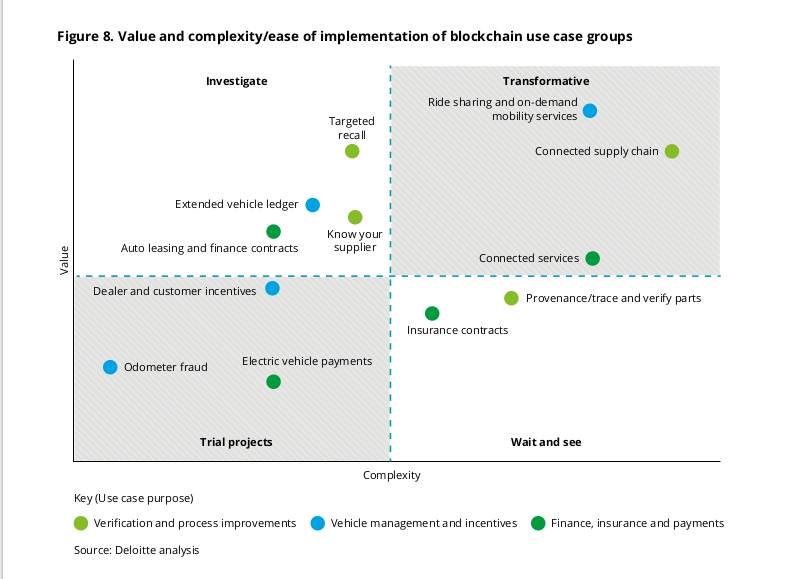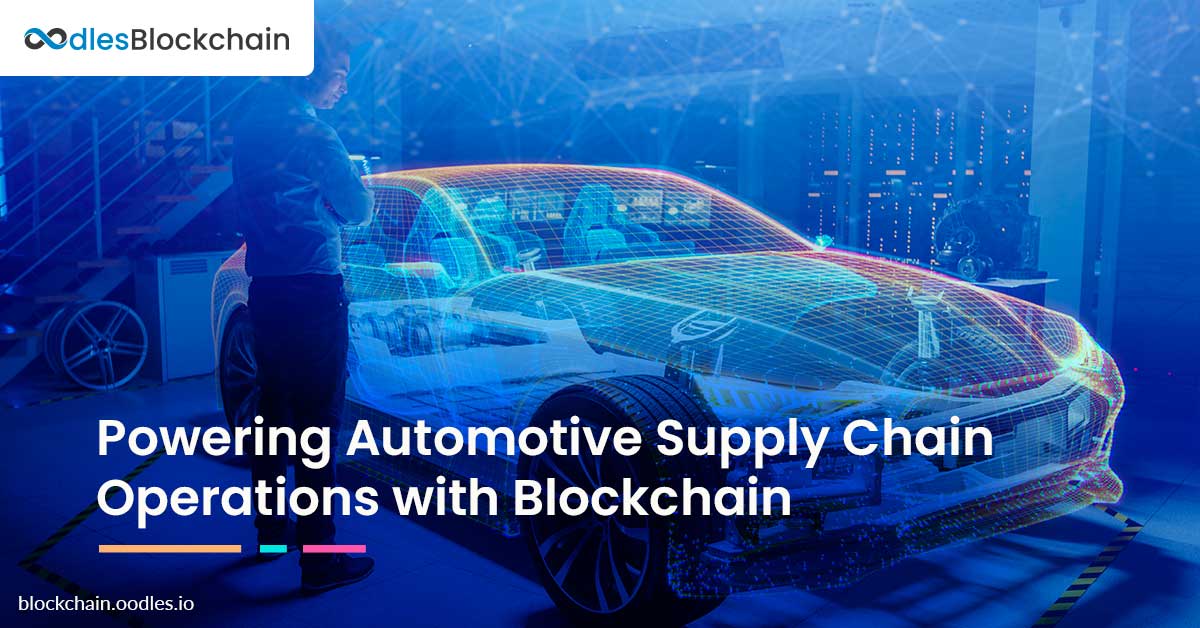-
The automotive sector has highly complex supply chain networks. Automotive industries work with several third-party companies for various vehicle parts to complete manufacturing processes. This dependency creates issues and flaws in automotive supply chains. These issues include lack of transparency, component counterfeiting, excessive paperwork, and more. Blockchain technology can help in overcoming these problems. This article entails the potential of blockchain supply chain development services in the automotive industry.
Understanding Blockchain
A blockchain is a shared distributed database or ledger across computer network nodes. It serves as an online database for storing information in a digital format. The technology, if used as the underlying infrastructure, can revamp the entire automotive supply chain. It can benefit the automotive supply chain industry in multiple ways. It can provide tamper-proof transaction history, a transparent supply chain, easy-to-track operations, and more.
Advantages of Blockchain for Automotive Supply Chain
Streamlined Administration
Blockchain technology's implementation expedites administrative supply chain processes, reduces additional costs incurred, and maintains transaction protection. Eliminating the supply chain middlemen and intermediaries reduces the risks of fraud, commodity duplicates, and saves money. Customers and suppliers can manage payments inside the supply chain using cryptocurrencies instead of depending on EDI. It will also increase productivity and reduce the chance of missing goods with correct record keeping.
Trust and Security
Trusting multiple participants in complex supply chains is crucial for smooth operations. For example, if a manufacturer sells his goods to suppliers, he/she should be able to rely on them for upholding safety standards at the factory. Also, trust plays a key role when it comes to regulatory compliance, such as custom enforcers. Blockchain's irreversible role in the supply chain efficiently prevents tampering. The blockchain avoids the threats that come with centrally controlled data by storing data through its network. Its infrastructure lacks central vulnerability factors that hackers can abuse. The internet today has security concerns common to us. To secure our identity and properties online, we all rely on the "Username / Password" scheme. Blockchain, on the other hand, uses encryption technology as a protection mechanism. The public and private 'keys' enables the encryption of data in the blockchain. A public key (a long, randomly generated string of numbers) on the blockchain is a user's address. Cryptocurrencies sent over the network remain registered as corresponding to that account. A private key is just like a code that provides access to its owner's digital properties. After the data is available on the blockchain, it is incorruptible. It may also entail the safeguarding of the private key by printing it out and making a hardware wallet to secure digital properties.
 Source: Deloitte Also, Visit | Reconditioning Automotive Operations with Blockchain Smart Contracts
Source: Deloitte Also, Visit | Reconditioning Automotive Operations with Blockchain Smart ContractsHow Blockchain can Benefit the Automotive Supply Chain
Automotive supply chain managers can use blockchain to multiple supply chain problems, like keeping complex databases and monitoring products and services. It serves as a far less corruptible and automated alternative to centralized databases. In the field of monitoring and testing products and services, a blockchain-based automotive supply chain management system allows for accurate record-keeping and monitoring of provenance as product information is accessible via embedded sensors and RFID tags. Automobile firms can document production updates to the blockchain. It gives time stamps for every transaction. So, companies can check the location or station of a product anytime. Also, this form of exact provenance monitoring can ensure fraud detection in any part of the supply chain. The car supply chain is a highly dynamic and big field with numerous participants, ranging from parts suppliers and producers to sellers. Delivering real customer value includes a review of existing infrastructure and business processes, as well as solutions that respect protection, confidentiality, and authorization permissions. Blockchain can prove an ideal solution. Automotive manufacturers can use this technology to protect their brands against counterfeit goods and to build customer-centered business models. Find Out More Blockchain Applications in the Automotive Industry
Countering Component Counterfeiting
Falsified goods pose a critical concern for car manufacturers in the automobile industry. It also puts the global demand for counterfeit spare parts at several billion dollars. Such goods may find their way through the supply chain either directly. Or, they may get through suppliers from the OEM and the aftermarket. Fraudulent replacement parts are not reliable because they have often deteriorated quality standards and frequently appear to malfunction. It inevitably causes disappointment to end-users, causing them to revoke their brand faith. Introducing blockchain technology for counterfeit goods is dramatically beneficial as it enables accurate identification and digital representation of replacement parts. Digital spare parts recognition provides clarity to the framework, which can be exchangeable across different network members Related Post | Blockchain Solutions Development for the Automotive Industry
Augmented Inbound and Outbound Logistics
Inbound logistics and blockchain-based manufacturing powered by blockchain smart contract solutions will make the automotive supply chain more efficient. The analysis of individual components of an inbound supply chain is currently problematic and vulnerable to errors. For the successful functioning of the supply chain, coordination between multi-tier suppliers, third-party logistics, and transportation companies through the manufacturing facility is essential. By using blockchain, businesses can ensure the availability of accurate and real-time information from various parties. Individuals concerned should verify the status, quantity, and position of individual pieces. The outbound supply chain is likewise a complex network consisting of producers, suppliers, importers, and dealers. These participants also don't have a shared model of data sharing which makes it hard for them to share information. A decentralized blockchain-based framework can boost accessibility and accountability, ensuring quicker transactions and shorter periods of settlement.
Internet of Things (IoT) and Blockchain Technology
By 2023, Gartner forecasts that blockchain will enable global movement and annual monitoring of 2 trillion dollars of products and services. But this growth is unlikely to occur without the support of integrated IoT platforms. By integrating IoT's real-time tracking and decentralized distributed ledger blockchain, track-and-trace precision, as well as scalability, become more efficient. It improves the efficiency of the automotive supply chain. Both innovations together further improve the dynamic relationships within the supply chain for automobiles. While this sounds good, further study may be necessary to decide how these activities occur.
Conclusion
Blockchain could offer a solution to many of the problems facing the industry today within one to two years due to its rapid advancement. We expect to see the tipping point within the next five years, with industry-wide acceptance of the wholesale. To realize potential benefits, companies need to analyze their strategic priorities. They have to determine which blockchain technologies are most appropriate for them, and how to invest. If you are looking for a blockchain service provider to streamline your automotive supply chain, then Oodles is the right partner. Connect with our blockchain experts to discuss your idea in detail.

Our Offices
INDIA
Emaar Digital Greens, Sector 61,
Gurugram, Haryana
122011.
Welldone Tech Park,
Sector 48, Sohna road,
Gurugram, Haryana
122018.














